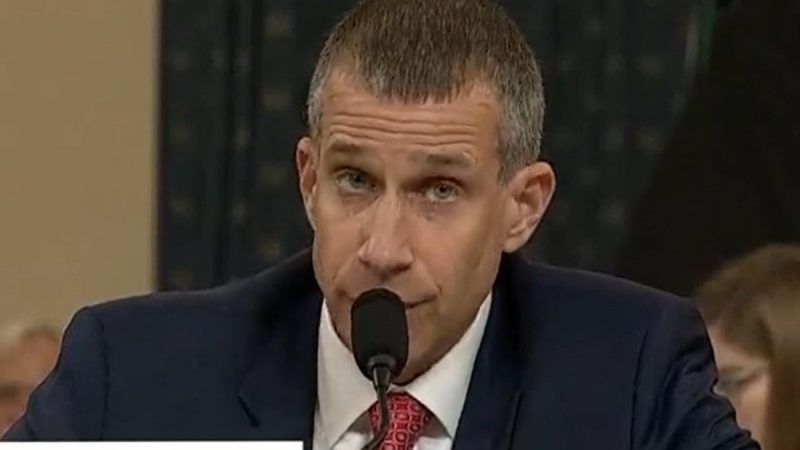Trump's Congressional Defenders Deny Reality
While the president’s motives in seeking Ukrainian investigations are a matter of dispute, his actions are clear from the public record.

During Monday's impeachment hearing, Republican lawyer Stephen Castor denied that Donald Trump had asked his Ukrainian counterpart to investigate former Vice President Joe Biden, a leading contender to oppose Trump in next year's election. "I don't think the record supports that," Castor said.
That jaw-dropping moment starkly illustrated the lengths to which Republicans have gone in rebutting the charge that Trump abused his powers for personal gain. The president's defenders have repeatedly contested well-established facts in a way that makes fair-minded nonpartisans despair of having an impeachment debate based on a shared understanding of reality.
According to the White House's own transcript of Trump's July 25 phone call with Ukrainian President Volodymyr Zelenskiy, Trump asked Zelenskiy to look into the claim that Biden pressed the Ukrainian government to replace Prosecutor General Viktor Shokin with the aim of thwarting an investigation of Burisma, an energy company that employed Biden's son Hunter as a board member. "There's a lot of talk about Biden's son, that Biden stopped the prosecution," Trump said, adding that "it sounds horrible to me."
Trump asked Zelenskiy to "look into it," and Zelenskiy agreed, saying his new prosecutor general "will look into the situation, specifically to the company that you mentioned" (i.e., Burisma). Trump himself has said what he wanted from Zelenskiy was "very simple"—"a major investigation into the Bidens."
You can argue, as Republicans have, that there was nothing improper about that request. But you cannot credibly deny that Trump made it.
Yet Castor claims to be agnostic on that point. "I think it's ambiguous," he insisted. Republican legislators likewise misrepresented the public record in their recent report on the impeachment inquiry, falsely claiming that Trump brought up the Bidens only "in passing" and that Zelenskiy "did not reply."
The Republican report concedes that Shokin, whom Trump described as a "very good prosecutor" whose dismissal was "really unfair," was "seen by State Department officials as corrupt and ineffective." Shokin's shortcomings were widely recognized, and his dismissal was consistent with the Obama administration's foreign policy, which makes Trump's claim that Biden was only trying to protect his son implausible.
The other part of the "favor" that Trump wanted, a subject he raised immediately after Zelenskiy expressed gratitude for U.S. military support, was an investigation of "what happened with this whole situation with Ukraine" involving "Crowdstrike" and "the server." Those are references to a bizarre conspiracy theory alleging that Ukrainians hacked the Democratic National Committee's emails during the 2016 presidential election campaign and framed Russia for the crime as part of an effort to hurt Trump and help Hillary Clinton.
That theory has been decisively rejected by U.S. intelligence agencies, congressional committees, and Special Counsel Robert Mueller. It is so disreputable that the Republican report pretends Trump was actually concerned about the broader issue of "Ukrainian influence in the 2016 election," as evidenced by a few Ukrainian officials' publicly stated preference for Clinton.
The report likewise argues that Trump was legitimately concerned about official corruption in Ukraine. But Trump did not broach that subject in the July 25 call or an earlier conversation with Zelenskiy, and his interest in discrediting Biden is consistent with the lobbying of his personal attorney, Rudy Giuliani, who by his own account was seeking "information [that] will be very, very helpful to my client" and who was intimately involved with the administration's efforts to secure a public commitment regarding the investigations from Zelenskiy.
Current and former administration officials have testified that such an announcement was a prerequisite for a White House meeting and the release of congressionally approved military aid that Trump had delayed without explanation. While Zelenskiy denies that he was "pressured" or subjected to "blackmail," that is exactly what you would expect an ally desperate for U.S. support to say, especially if he believes he is dealing with a mercurial president driven by personal interests.
Whether that's an accurate description of Trump is the issue at the center of his impeachment.
© Copyright 2019 by Creators Syndicate Inc.


Show Comments (411)